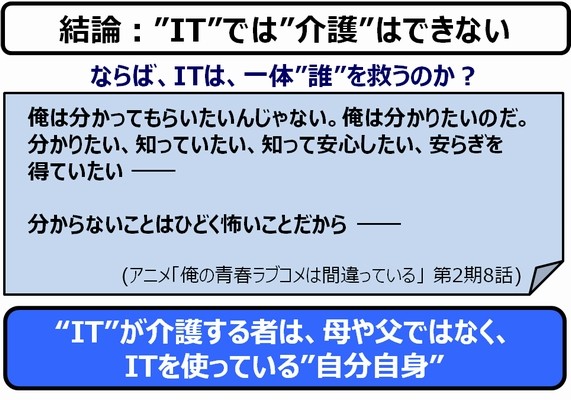tDiaryが動かなくなりました。
tDiary has stopped working.
20年近く、まったく手を入れなくても、動き続けたツールです。
It is a tool that has continued to work for nearly 20 years without any work at all.
これは、かなり凄いことだと思います。
I think this is quite amazing.
とは言え、tDiaryを自力でメンテする気力はありません。
However, I do not have the energy to maintain tDiary.
それに、自分でメンテするツールを使うのって結構怖いんですよね。
Besides, I'm pretty scared to use a tool I should maintain.
tDiarの場合、私は、見しらぬ言語のソースコードを、そのプログラム言語と、自分の経験のないOSで構築することになります。
In the case of tDiary, I would build the system with source code in an unfamiliar language, with a programming language and an operating system I have no experience with.
高確率で、kobore.netサーバ本体を破壊するでしょう。
At a high probability, I will destroy the kobore.net server itself.
-----
私のWebサイトの立ち上げは1993年です。
My Web site was launched in 1993.
最初の頃は、テキストでコラムを書いていただけでした。
In the beginning, I just wrote columns in text.
その後、プロバイダが提供してくれた簡易なメモスクリプトを使い、そして、その後tDiaryに移り、そして、今のメインは、WordPressです。
After that, I used a simple diary script provided by my provider, then moved to tDiary, and now my main focus is on WordPress.
WordPressは便利なツールですけど、5年後にはどうなっているか分かりません。
WordPress is a valuable tool, but I don't know what it will be like in 5 years.
私は、これまでの人生で、新しいシステムが登場して、そして、古いコンテンツが旧システムと共に消滅していくのを、ずっと眺めていました。
I have watched new systems appear all my life, and then old content disappears along with the old system.
-----
私、毎日日記書いていますけど、「人に読まれること」よりも、「未来の自分にメモを残すこと」の方を重視しております。
I write a diary daily but am more concerned with “leaving notes for my future self” than “for people to read.”
つまり『見栄えはどうだっていい』です。
In other words, 'I don't care how it looks.
Webサイトなんぞ、htmlだけでいいんです。
Websites only need html.
実際に、私のkobore.netのサイトは、html 100%です。
In fact, my kobore.net site is 100% html.
おかげで、30年間、index.htmlの更新だけで、Webサイトの運営を続けていられます。
Thanks to this, I have kept the website running for 30 years with only index.html updates.
(と言いつつ、ヒット数稼いでいるのは、WordPressの方ですが)
(Although it is WordPress that is earning the PV.)
-----
で、今、htmlとCSSだけを使った、超簡単な日記サイトを作ろうか、と思っています。
So now I'm considering creating an elementary diary site using only HTML and CSS.
htmlの入門書の内容を、まるごとパクればいけそうです。
It seems possible to take all the contents of the introductory HTML book.
プログラム言語に依拠しないシステムは、メンテナンスが簡単です。
Systems that do not rely on programming languages are easier to maintain.
『包丁一本 晒(さらし)に巻いて』という感じで、『"index.html"一本、テキストのみで生きていく』で、私はいいんです。
I'm OK with “I'm going to live with only one ‘index.html’ text,” as in “I'm going to wrap one knife in a bleached cloth.

